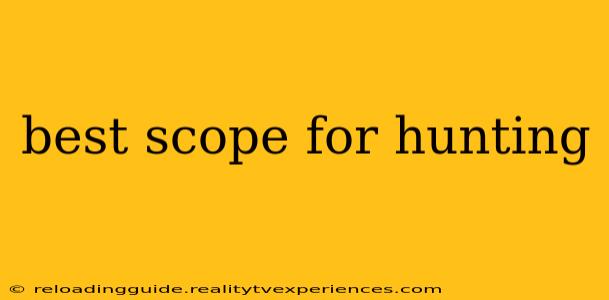Choosing the right hunting scope can significantly impact your success in the field. The "best" scope depends entirely on your specific needs, hunting style, and the game you pursue. This guide breaks down the crucial factors to consider, helping you select the perfect optic for your next hunt.
Understanding Key Scope Specifications
Before diving into specific recommendations, let's clarify some essential scope specifications:
1. Magnification:
-
Low Magnification (1-4x, 1-6x): Ideal for close-to-medium range hunting, particularly in thick brush or wooded areas. Offers a wide field of view, crucial for quick target acquisition. Excellent for moving targets like hogs or deer in dense cover.
-
Medium Magnification (3-9x, 4-12x): Versatile option suitable for a broader range of hunting situations. Provides a balance between field of view and magnification for shots at moderate distances. A popular choice for many hunters.
-
High Magnification (6-24x, 8-32x): Best suited for long-range shooting, such as precision shots at game at significant distances. Requires a stable shooting platform and a keen understanding of ballistics. Typically used for varmints or long-range hunting.
2. Objective Lens Diameter:
This refers to the diameter of the front lens, influencing light gathering capabilities. Larger objective lenses (e.g., 50mm, 56mm) perform better in low-light conditions but are bulkier and heavier. Smaller lenses (e.g., 32mm, 40mm) are lighter and more compact, ideal for maneuverability in dense environments.
3. Reticle:
The reticle is the crosshairs in your scope. Numerous types exist, each designed for different hunting styles and purposes:
-
Simple Crosshairs: Easy to use and offer minimal obstruction of the target. Excellent for quick shots.
-
BDC (Ballistic Drop Compensator) Reticles: Incorporate holdover points for different ranges, compensating for bullet drop. Useful for long-range shooting.
-
Illuminated Reticles: Offer better visibility in low-light conditions. Can be advantageous during dawn or dusk hunts.
4. Turrets:
-
Tactical Turrets: Allow for precise adjustments and tracking of your shots. Typically used for long-range shooting.
-
Hunting Turrets: Often capped to prevent accidental adjustments, ideal for hunters who prefer less fiddling with settings in the field.
Best Scope Types for Different Hunting Scenarios
-
Whitetail Deer Hunting (Woods): A low-to-medium magnification scope (1-4x or 3-9x) with a simple reticle and a relatively small objective lens (40mm-50mm) would be ideal. Prioritize a wide field of view for quick target acquisition.
-
Whitetail Deer Hunting (Open Fields): A medium-to-high magnification scope (3-9x or 4-12x) might be preferred, allowing for shots at longer ranges. A larger objective lens (50mm or larger) could improve low-light performance.
-
Long-Range Hunting (Elk, Antelope): High magnification scopes (6-24x or higher) with ballistic drop compensating reticles and tactical turrets are essential. A large objective lens (50mm or larger) will be beneficial.
-
Predator Hunting (Coyotes, Foxes): A medium magnification scope (3-9x) with an illuminated reticle for low-light conditions can be highly effective. A smaller, lighter scope may also improve maneuverability.
Choosing Your Perfect Scope: A Step-by-Step Approach
- Identify Your Primary Hunting Game and Terrain: This dictates the necessary magnification and field of view.
- Determine Your Shooting Distance: Short-range hunting requires less magnification than long-range shooting.
- Consider Light Conditions: Low-light hunts benefit from scopes with larger objective lenses and possibly illuminated reticles.
- Set a Budget: Scope prices range significantly, so determine how much you're willing to invest.
- Read Reviews and Compare Models: Research different scopes within your chosen specifications, paying close attention to user reviews.
Choosing the right hunting scope is a crucial investment that enhances your hunting experience and increases your chances of success. Take the time to carefully consider your needs and preferences to make an informed decision. Remember that consulting with experienced hunters or professionals at sporting goods stores can provide invaluable guidance.

